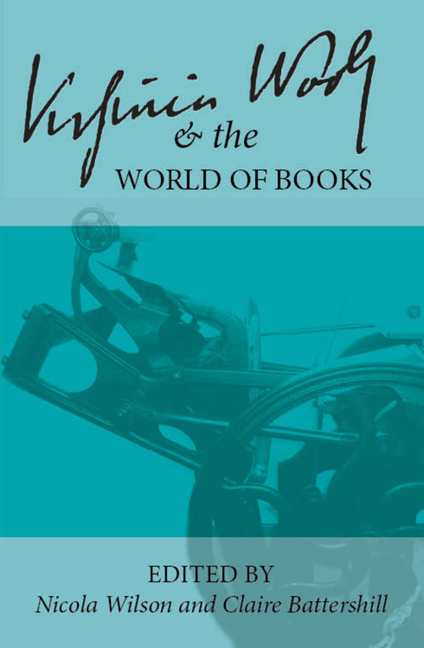 Virginia Woolf and the World of Books
Virginia Woolf and the World of Books Book contents
- Frontmatter
- Contents
- Introduction
- List of Abbreviations
- Keynote
- In the Archives
- Craftsmanship
- The Hogarth Press
- Hours in A Library
- The Art of the Book
- The Art of the Narrative
- Making New Books: Creative Approaches
- The Book in the World: Woolf's Global Reception
- Editing and Teaching Woolf
- Intertextuality
- Lives in Writing
- Notes on Contributors
Introduction
- Frontmatter
- Contents
- Introduction
- List of Abbreviations
- Keynote
- In the Archives
- Craftsmanship
- The Hogarth Press
- Hours in A Library
- The Art of the Book
- The Art of the Narrative
- Making New Books: Creative Approaches
- The Book in the World: Woolf's Global Reception
- Editing and Teaching Woolf
- Intertextuality
- Lives in Writing
- Notes on Contributors
Summary
“By the way, we've bought our printing press.…Heaven knows how one prints—but please consider whether you haven't a page or two of practically faultless prose in some desk.” —Virginia Woolf to Lady Robert Cecil, 14 April 1917 (L2 149)
The year 2017 marked the centenary of the founding of the Hogarth Press. Begun small and domestic, with barely-paid assistants brought in to help typeset and print “all our friends [sic] stories” (L2 120), Virginia and Leonard Woolf 's tabletop press grew into a financially prosperous and well-respected publishing house. It outlived its like-minded models and contemporaries in the period of modernist small presses—including Roger Fry's Omega Workshops (1913–19), Nancy Cunard's Hours Press (1928–31), and Laura Riding and Robert Graves’ Seizen Press (1927–35)—to flourish in the postwar era. With Leonard still at the helm, the Hogarth Press was acquired as a limited company by Chatto & Windus in 1946 when John Lehmann sold his fifty per cent share.
The Hogarth Press as run by Leonard and Virginia Woolf was constantly surprising in its output. Though it is still best known for its publishing links within Bloomsbury, its lists were eclectic and outward-looking, generically and geographically diverse. The Press published educational pamphlets, essays, letters, self-help books, and children's literature, as well as poetry and works on aesthetics, biographies and histories, and innovative and bestselling novels. We have been working on the Hogarth Press for several years now, but it was still a delight to be pulled up short by Professor Susheila Nasta's description of it as “a radical left-wing publisher” during her keynote on “The Bloomsbury Indians.” Looking through Hogarth's lists consistently asks us to re-think well-worn narratives and to question what we know about Virginia Woolf. Just like her writing, the Hogarth Press offers a queering of knowledge, a questioning of the basis of our assumptions. There are so many surprises in the nearly 500 works published up to and including its incorporation with Chatto in 1946. The Hogarth Press is a delight for collectors and readers and writers to explore.
The 27th Annual Virginia Woolf conference was all about the centenary and the chance it offered us to rethink Woolf as publisher and author and to celebrate the world of small presses, the resurgence of letterpress, and the role of independent publishers today.
- Type
- Chapter
- Information
- Virginia Woolf and the World of BooksSelected Papers from the Twenty-seventh Annual International Conference on Virginia Woolf, pp. vii - ixPublisher: Liverpool University PressPrint publication year: 2018


